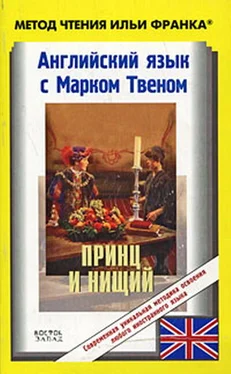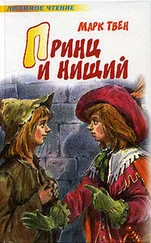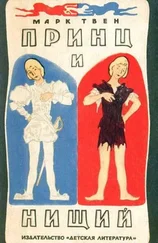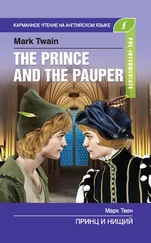When the king awoke in the morning (когда король проснулся; to awake — просыпаться), the women were gone (женщины исчезли; to go — идти, уйти, исчезнуть).
'They are saved (они спасены)!' he said, joyfully (он сказал весело); then added, despondently (затем добавил уныло), 'but woe is me (но горе мне)! — for they were my comforters (ибо они были моими утешителями).'
reverie [`revərı], grieve [gri:v], arouse [ə`rauz]
This news struck his majesty dumb with amazement, and plunged him into so deep and dismal a reverie that he heard no more of the old man's gossip. He wondered if the 'little urchin' was the beggar-boy whom he left dressed in his own garments in the palace. It did not seem possible that this could be, for surely his manners and speech would betray him if he pretended to be the Prince of Wales — then he would be driven out, and search made for the true prince. Could it be that the court had set up some sprig of the nobility in his place? No, for his uncle would not allow that — he was all-powerful and could and would crush such a movement, of course. The boy's musings profited him nothing; the more he tried to unriddle the mystery the more perplexed he became, the more his head ached, and the worse he slept. His impatience to get to London grew hourly, and his captivity became almost unendurable.
Hendon's arts all failed with the king — he could not be comforted, but a couple of women who were chained near him, succeeded better. Under their gentle ministrations he found peace and learned a degree of patience. He was very grateful, and came to love them dearly and to delight in the sweet and soothing influence of their presence. He asked them why they were in prison, and when they said they were Baptists, he smiled, and inquired:
'Is that a crime to be shut up for in a prison? Now I grieve, for I shall lose ye — they will not keep ye long for such a little thing.'
They did not answer; and something in their faces made him uneasy. He said, eagerly:
'You do not speak — be good to me, and tell me — there will be no other punishment? Prithee, tell me there is no fear of that.'
They tried to change the topic, but his fears were aroused, and he pursued it:
'Will they scourge thee? No, no, they would not be so cruel! Say they would not. Come, they will not, will they?'
The women betrayed confusion and distress, but there was no avoiding an answer, so one of them said, in a voice choked with emotion:
'Oh, thou'lt break our hearts, thou gentle spirit! God will help us to bear our —'
'It is a confession!' the king broke in. 'Then they will scourge thee, the stony-hearted wretches! But oh, thou must not weep, I cannot bear it. Keep up thy courage — I shall come to my own in time to save thee from this bitter thing, and I will do it!'
When the king awoke in the morning, the women were gone.
'They are saved!' he said, joyfully; then added, despondently, 'but woe is me! — for they were my comforters.'
Each of them had left a shred of ribbon (каждая из них оставила лоскут ленты) pinned to his clothing (приколотый к его одежде), in token of remembrance (в знак памяти). He said he would keep these things always (он сказал, что будет хранить эти вещи всегда); and that soon he would seek out (и что скоро он разыщет) these dear good friends of his (этих милых добрых подруг его) and take them under his protection (и возьмет их под свою защиту).
Just then the jailer came in (как раз тогда тюремщик вошел внутрь; to come in — войти внутрь) with some subordinates (с несколькими подчиненными) and commanded that the prisoners be conducted (и приказал, чтобы заключенные были препровождены) to the jail-yard (в тюремный двор). The king was overjoyed (король был очень обрадован) — it would be a blessed thing (это была бы благословенная вещь) to see the blue sky (увидеть голубое небо) and breathe the fresh air (и подышать свежим воздухом) once more (снова). He fretted and chafed at the slowness (он беспокоился и раздражался на медлительность) of the officers (офицеров), but his turn came at last (но его очередь подошла наконец) and he was released from his staple and ordered (и он был освобожден из своей скобы = своих оков и получил приказ; to order — приказывать) to follow the other prisoners (последовать за другими заключенными), with Hendon (с Хендоном).
The court, or quadrangle (площадка, или четырехугольный двор), was stone-paved (был вымощен камнем; to pave — мостить), and open to the sky (и открыт небу). The prisoners entered it (заключенные вошли в него) through a massive archway of masonry (через большую арку каменной кладки), and were placed in file (и были поставлены в шеренгу), standing, with their backs against the wall (стоящие, с их спинами против стены = у стены). A rope was stretched (веревка была протянута) in front of them (перед ними), and they were also guarded by their officers (и они также охранялись своими офицерами). It was a chill and lowering morning (это было морозное и хмурое утро), and a light snow (и светлый снег) which had fallen during the night (который нападал в течение ночи; to fall — падать) whitened the great empty space (выбелил гигантское пустое пространство) and added to the general dismalness (и прибавил к общей мрачности; dismal — мрачный; гнетущий, тягостный; зловещий) of its aspect (его вида). Now and then (порой: «сейчас и тогда») a wintry wind shivered through the place (ледяной ветер дрожал = проносился по этому месту) and sent the snow eddying (и закручивал снег маленькими вихрями; to send — посылать; to eddy — завихряться) hither and thither (сюда и туда).
In the center of the court stood two women (в центре двора стояли две женщины; to stand — стоять), chained to posts (прикованные к столбам). A glance showed the king (один взгляд показал королю) that these were his good friends (что эти = это были его добрые подруги). He shuddered (он вздрогнул), and said to himself (и сказал себе), 'Alack (увы), they are not gone free (они не ушли свободными; to go — идти, уйти), as I had thought (как я полагал; to think — думать). To think that such as these (подумать, что такие, как они) should know the lash (должны познать порку; lash — бич; the lash — порка)! — in England (в Англии)! Ay, there's the shame of it (да, вот позор этого) — not in Heathenesse (не в языческом мире; устар. вместо совр. heathendom — язычество; heathen — языческий), but Christian England (но в христианской Англии)! They will be scourged (они будут избиты плетьми); and I, whom they have comforted (а я, кого они утешали) and kindly entreated (и ласково увещевали), must look on (должен смотреть дальше) and see the great wrong done (и видеть великую несправедливость сделанной; to do — делать); it is strange, so strange (это странно, так странно)! that I, the very source of power (что я, самый источник власти) in this broad realm (в этом обширном королевстве), am helpless to protect them (беспомощен = не могу защитить их). But let these miscreants (но пусть эти подлецы) look well to themselves (позаботятся о себе; to look to — заботиться: «смотреть к»), for there is a day coming (ибо тот день приходит) when I will require of them (когда я потребую от них) a heavy reckoning for this work (тяжелой расплаты за это дело). For every blow (за каждый удар) they strike now (который они нанесут сейчас; to strike — бить) they shall feel a hundred then (они испытают сотню тогда).'
Читать дальше
Конец ознакомительного отрывка
Купить книгу




![Марк Твен - Принц и нищий [Издание 1941 г.]](/books/148799/mark-tven-princ-i-nichij-izdanie-1941-g-thumb.webp)







